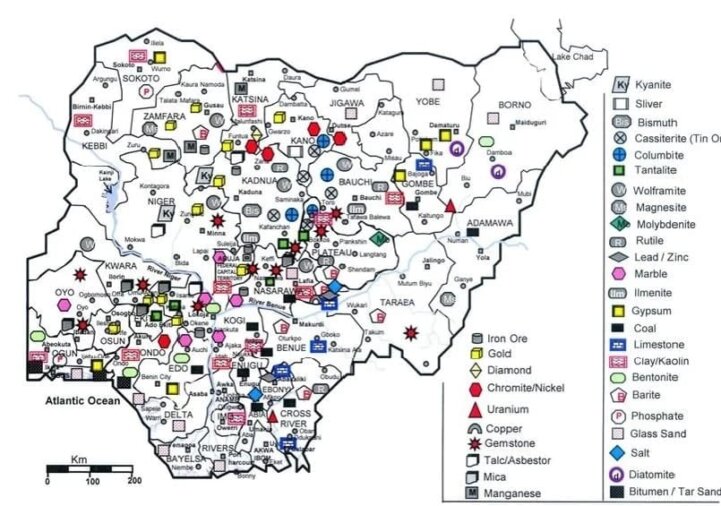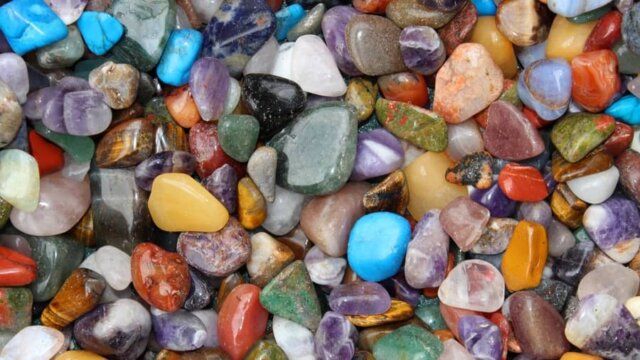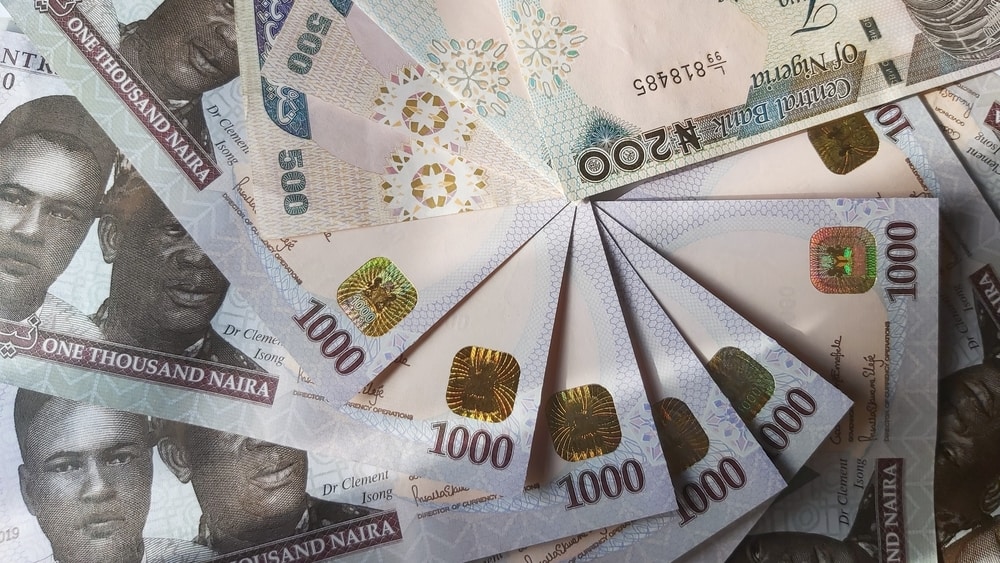This article contains a comprehensive list of the common mineral resources in Nigeria and their locations.
Have you ever wondered about the locations of Nigeria’s natural resources? Wondered the uses of the solid minerals in Nigeria? The answers to those questions are covered in this article.
Definition of Mineral Resources
Mineral resources are natural resources. They are important raw materials used by industries due to their economic properties.
They are usually found on the earth’s crust and as a result, they are easily extracted. Examples are gold, quartz, leaf, limestone, etc.
In Nigeria, exploration is carried out to find new mineral resources. The country relies on the supply of solid materials to other countries.
The exploration and production of crude oil is a fine example. There are several other important mineral resources in Nigeria that we will be talking about today.
It is important to know that all mineral resources are natural resources, but not all natural resources are mineral resources. Water resources and agricultural resources are other forms of natural resources.
However, our primary concern today is the mineral resources in Nigeria.
Map Showing Mineral Resources in Nigeria

Above is a map showing the mineral resources in Nigeria. With the aid of the legends on the map, you can easily locate the mineral resources. The map also contains some very rare minerals that are found in the country.
Major Mineral Resources in Nigeria and Their Location (States)
| Location | Mineral resources in Nigeria |
|---|---|
| Abuja (FCT) | Cassiterite, Clay, Dolomite, Gold, Iron Ore, Lead /Zinc, Marble, and Tantalite. |
| Abia State | Crude Oil, Gold, Lead/Zinc, Limestone, and Salt. |
| Adamawa State | Bauxite, Barytes, Bentonite, Gypsum, Kaolin, and Magnesite. |
| Akwa-Ibom State | Clay, Crude Oil, Lead/Zinc, Lignite, Limestone, Salt, and Uranium. |
| Anambra State | Clay, Glass Sand, Gypsum, Iron-Ore, Lead/Zinc, Lignite, Limestone, Phosphate, and Salt. |
| Bauchi State | Amethyst, Gypsum, Lead/Zinc, and Uranium. |
| Bayelsa State | Clay, Crude Oil, Gypsum, Lead/Zinc, Lignite, Limestone, Manganese, and Uranium. |
| Benue State | Bauxite, Clay, Coal, Gemstone, Gypsum, Iron-Ore, Lead/Zinc, Limestone, Marble, and Salt. |
| Borno State | Bentonite, Clay, Diatomite, Gypsum, Kaolin, and Limestone. |
| Cross River State | Crude Oil, Lead/Zinc, Lignite, Limestone, Manganese, Salt, and Uranium. |
| Delta State | Crude Oil, Clay, Glass Sand, Gypsum, Iron-Ore, Kaolin, Lignite, and Marble. |
| Ebonyi State | Gold, Lead, and Salt. |
| Edo State | Bitumen, Clay, Crude Oil, Dolomite, Glass Sand, Gold, Gypsum, Iron Ore, Lignite, Limestone, Marble, and Phosphate. |
| Ekiti State | Feldspar, Granite, Kaolin, and Syenite. |
| Enugu State | Coal, Iron Ore, Lead/Zinc, and Limestone. |
| Gombe State | Gemstone and Gypsum. |
| Imo State | Crude Oil, Gypsum, Lead /Zinc, Lignite, Limestone, Marcasite, Phosphate, and Salt. |
| Jigawa State | Amethyst, Copper, Kaolinite, Iron Ore, Potash, Silica, and Tourmaline. |
| Kaduna State | Amethyst, Asbestos, Aquamarine, Clay, Crystal, Fluorspar, Gemstone, Gold, Graphite, Kaoline, Kyanite, Mica, Nickel, Sapphire, Serpentinite, Tantalite, Tourmaline, Topaz and Ruby. |
| Kano State | Cassiterite, Copper, Glass Sand, Gemstone, Lead/Zinc, and Tantalite. |
| Katsina State | Kaolin, Marble, and Salt. |
| Kebbi State | Gold |
| Kogi State | Bitumen, Coal, Dolomite, Feldspar, Gemstone, Gypsum, Iron Ore, Kaolin, Limestone, Marble, Talc, and Tantalite. |
| Kwara State | Cassiterite, Columbite, Feldspar, Gold, Iron-Ore, Marble, Mica, and Tantalite. |
| Lagos State | Bitumen, Clay, Crude Oil, Glass Sand, and Tar. |
| Nasarawa State | Aquamarine, Amethyst (Garnet, Topaz), Beryl (Emerald), Barytes, Cassiterite, Chalcopyrite, Coal, Columbite, Clay, Dolomite, Feldspar, Galena, Hellodor, Iron-Ore, Limestone, Limonite, Marble, Mica, Salt, Sapphire, Talc, Tantalite, Tourmaline, Quartz, and Zircon. |
| Niger State | Gold, Iron Ore, and Lead/Zin. |
| Ogun State | Bitumen, Clay, Feldspar, Gemstone, Kaolin, Limestone, and Phosphate. |
| Ondo State | Bauxite, Bitumen, Clay, Coal, Crude Oil, Dimension stones, Feldspar, Gemstone, Glass Sand, Granite, Gypsum, Kaolin, and Limestone. |
| Osun State | Columbite, Gold, Granite, Talc, Tantalite and Tourmaline. |
| Oyo State | Aquamarine, Cassiterite, Clay, Dolomite, Gold, Gemstone, Kaoline, Marble, Sillimanite, Talc, and Tantalite. |
| Plateau State | Bauxite, Barytes, Bentonite, Bismuth, Cassiterite, Clay, Coal, Columbite, Emerald, Fluoride, Gemstone, Granite, Iron-Ore, Kaolin, Lead/Zinc, Marble, Molybdenite, Salt, Tantalite, Tin and Wolframite. |
| Rivers State | Clay, Crude Oil, Glass Sand, Lignite, and Marble. |
| Sokoto State | Clay, Flakes, Gold, Granite, Gypsum, Kaolin, Laterite, Limestone, Phosphate, Potash, Salt, and Silica-sand. |
| Taraba State | Kaolin and Lead/Zinc. |
| Yobe State | Diatomite and Soda. |
| Zamfara State | Alluvial Gold, Chromate, Clay, Granite, and Iron Ore. |
List of Mineral Resources in Nigeria and Their locations
When it comes to mineral resources, Nigeria is indeed gifted. There are large amounts of these minerals available. Hence, the reason the continuous exploration in several parts of the country. We have listed the minerals in Nigeria and included a background to the table able.
Below is a list of the major mineral resources in Nigeria and where you can find them;
1. Baryte and Bentonite
Baryte is the primary ore of barium and is used in forming compounds, while Bentonite is a spongy aluminium phyllosilicate clay. Together, Baryte and Bentonite Barite are used in preparing water-based mud. Hence, they are the primary constituents used in the drilling of different types of oil wells.
The softness of Baryte and Bentonite serves several purposes. It helps to prevent damage to drilling tools while drilling and as a coolant and lubricant. BaSO4 is the chemical compound formed, and the mineral consisting of barium sulphate.
In Nigeria, close to a thousand million tonnes of Bentonite is available across the country. The mineral can be found in Borno, Plateau, and Adamawa State. While Baryte available is ten times the number of Bentonite in the country.
The compound has a high specific gravity of about 4.35 g/cm³. While its Mohs’ hardness is between 2.9 to 3.4.
2. Bitumen
Bitumen is one of the most important mineral resources in Nigeria. It was discovered in the early 1900s in the country and exploration began around that time.
However, due to its use in Nigeria, it has a volume that is twice the amount of available crude oil. Currently, over 40 billion tonnes of bitumen is available in Nigeria.
Like crude oil, Bitumen is a form of hydrocarbon. It is important to not that bitumen itself is a lower grade of crude oil. When found in oil reservoirs, the mineral is very thick and in viscous liquid form. Therefore, you need to extract it from the ground.
The use of bitumen can easily be found around the country. The mineral is an important component in road construction in Nigeria. It can be found in Edo, Ogun, Ondo and Lagos state. Sadly, the country relies on the importation of bitumen due to the lack of large reserves.
Bitumen is one of the common Energy Minerals in Nigeria. In engineering construction, it is mostly used for roofing and paving. When constructing roads, footpaths, runways, and parking lots, bitumen is used as a binder in asphalt. It can also be used in laying of pipelines and waterproofing in construction.
A common challenge faced with bitumen is that it is difficult to extract it from the ground. However, sometimes it occurs on the surface.
3. Coal
Coal is a tough rock that turns to solid fossil fuel when it passes through fire. The main component of this mineral is carbon, while oxygen, hydrogen, nitrogen, and sulphur are in smaller amounts. There are four major types of coal, namely; bituminous, sub-bituminous, lignite, and anthracite.
Coal is one of the mineral resources in Nigeria. This mineral was discovered around 19009 in Enugu. However, its exploration did not begin till 1916 at Ogbete Mine. Nigeria’s coal is regarded as one of the best due to its ash content and low sulphur, making it environmentally friendly.
It is estimated that Nigeria has about 3 billion tonnes of coal reserves in close to 20 coal fields. However, there are currently around 500 million tonnes of reserves that are in use. Despite its availability, the mineral is not so much in use compared to Gas and Diesel.
In Nigeria, the government considering privatisation of the coal reserves. While in other countries, coal is widely used. As a source of energy, coal was used since ancient times. This is quite different in Nigeria as Petroleum is the preferred option.
Some of the states with coal in Nigeria are Ondo, Benue, Zamfara, Plateau, and Nasarawa state.
4. Crude Oil (Petroleum and Natural Gas)
Currently, crude oil is the most important of all the mineral resources in Nigeria.
Petroleum and natural gas were first discovered in the late 1950s in a town in Bayelsa state. Hence, why Oloibiri, Bayelsa is the home of crude oil. Well, crude oil is Nigeria’s gold.
The petroleum found in Nigeria is categorised as “sweet” and “light.” In OPEC, Nigeria is known for this kind of oil. Also, the crude oil is referred to as “Bonny Light”, named after a river in Bayelsa.
Other names for Nigerian crude oil depending on their terminals are; Pennington Anfan, Brass River, Forcados, Escravos blend, and Qua Ibo.
The amount of crude oil produced in Nigeria is about 2.6 million barrels in a day. While the Gas reserves are estimated to be over 150 trillion m³.
There about 9 oil-producing states in Nigeria, with speculations that there may be oil in some other states. A bulk of the crude oil produced in Nigeria is from the Niger Delta region.
In Africa, Nigeria is ranked as the largest oil producer. The country has been a member of OPEC since 1971. OPEC is an acronym that stands for Organization of Petroleum Exporting Countries. As a country that depends on oil exportation, over 90% of its revenue is from the oil sector.
Nigeria has been a supplier of crude oil to the United States. Over the last decade, about 10% of US crude oil was bought from Nigeria. However, the percentage bought from Nigeria continues to reduce due to alternatives.
There are 4 refineries in Nigeria. Two in Rivers state, one in Kaduna State and one in Delta State. Sadly, the country does not utilise any of them, as they are in deplorable conditions. As a result, crude oil is exported for refinement.
The recognised oil-producing states in Nigeria are Bayelsa, Akwa-Ibom, Rivers, Delta, Imo, Ondo, Abia, and Edo. The majority of the country’s reserves are around the River Niger day region.
Interestingly, there is still room for expansion in Nigeria’s oil sector. A new refinery is being built in Lagos state by Dangote Plc in collaboration with some Chinese partners.
The major challenge with petroleum and natural gas in Nigeria is the vandalisation of pipelines. Some inhabitants feel they are being exploited and their voices are not being heard. Hence, take matters into their hands with illegal methods.
According to DPR, there are about 160 oil fields, and close to 1500 oil wells in Nigeria. More than half of the oil fields are located in the South-South geopolitical zone.
5. Gemstones
Gemstones are relevant when talking about common mineral resources in Nigeria. There are several of these gemstones available. They can be found in higher quantities in northern states in Nigeria, namely; Bauchi, Plateau, and Kaduna State.
There is a long list of gemstones in Nigeria, they include; aquamarine, zircon, amethyst, sapphire, emerald, tourmaline, fluorspar, ruby, garnet and topaz.
These are just some of the common gemstones in the country. Some are available in smaller quantities, while others in large quantities. Hence, the reason Nigeria is one of the countries with the most gemstones.
Usually, the gemstones are hard before it is cut into smaller sizes and polished for aesthetic purposes. Irrespective of its use, whether used as jewelry or not, it is admirable because of its beauty and value. These gemstones are produced as simulated or synthetic gemstones.
The synthetic gemstones and simulated gemstones found in Nigeria are similar in both chemical and physical properties. However, synthetic gemstones are created in a controlled environment. They are created to look like diamonds, sapphires, and emeralds. Although it is manufactured in a laboratory, they are not just replicas due to their attributes.
The simulated gemstones are made of glass, plastic, and resins. It is also referred to as imitation gemstones. Although it can be made to be similar in appearance with an actual diamond, it is only a replica.
Currently, the mining of gemstones in Nigeria is mostly done illegally. The government has not given much attention to regulating these precious stones. As a result of illegal mining, there are environmental and health hazards.
6. Glass Sands
Glass sands are amongst the major mineral resources in Nigeria. They can be found in huge amounts in Anambra, Delta, Edo, Kano, Lagos, Ondo and Rivers State. For example, in Anambra state, there are large deposits an escarpment close to Enugu. There are other Sandstones across the country where they are found.
These glass sands have high economic relevance because they are used in the manufacture of glass. The sand is suitable for making glass because of the high silica content in its composition. Glass sand also contains lower contents of chromium, iron oxide, cobalt, and a few other colourants.
The deposits of glass sands in Nigeria are in several localities within the southern region. Over the years, some of these locations have been investigated and large quantities have been found to be in existence.
When there are enough quantity and high quality, the sandstones are used by industries that produce bottles.
In Ughelli, Delta State and Port-Harcourt, Rivers State, glass sand is also used for the manufacture of sheet glass.
7. Gold
Gold is one of the mineral resources in Nigeria with low exploration. This mineral is still being exploited on a smaller scale when compared to other major minerals. Gold is exploited in some states in Nigeria, namely; Edo, Zamfara, Ebonyi, Sokoto, Abuja, Oyo, Kaduna, Niger, Bauchi, Kebbi, and Kwara State.
The majority of the gold deposits are in the northern part of Nigeria. There is not so much quantity in the southern counterparts. The gold production in the country started in the early 1910s, however, it was not till the 1930s that it peaked production. Since production declined during the Second World War, Nigeria never recovered.
As a result of lack of funds, the Nigerian Mining Corporation (NMC), harder to explore and produce more of this mineral. The reliance on crude oil by the Nigerian government also deprived attention that would have been given to gold. Hence, the reason crude oil is referred to as the new gold in the country.
The mining of gold is carried out in small quantities. It is mostly explored by villagers and local miners that live in areas where this precious mineral is found.
8. Gypsum
Gypsum is a mineral that is widely available in Nigeria. This is a mineral that is important in the manufacture of cement, chalk, and Plaster of Paris (POP). These are things that are easily accessible in Nigeria.
There are over a billion tonnes of gypsum deposits in Nigeria. A reasonable amount can be found Gombe, Adamawa, Sokoto, Anambra, Ondo, Bauchi, Kogi, Bayelsa, Imo, Benue, Edo, Delta, and Borno State.
As one of the common mineral resources in Nigeria, Gypsum is not being properly utilised. The country can be able to produce more since there are large deposits.
Classroom chalks, Cement, and POP are things that in regular use in Nigeria. Therefore, as gypsum is a major constituent, it is important to enhance explorations and productions.
Also, to satisfy the demand for items that really on gypsum for production, large scale mining of the mineral is required. Hence, the usage of current gypsum plants and further expansion.
The required amount of cement production in Nigeria is about 10 million tonnes. However, due to the low production, about 8 million tonnes are produced every year. Since gypsum deposits are over a billion tonnes, there is a possibility for expansion.
9. Iron Ore
Iron ore is amongst the major mineral resources in Nigeria with large deposits in the country. The largest amount of this mineral is found in Itakpe, Kogi State. There are also deposits in Abuja, Niger, and Enugu State. It is estimated that over 4 billion metric tonnes of this mineral are available in the country.
In the late 1970s, the National Iron Ore Mining Company (NIOMCO) was formed for the exploration of iron ore. It heads two steel companies, Delta Steel Company in Aladja and Ajaokuta Steel Company in Ajaokuta, Kogi State. Sadly, since the formation of these companies, they have not been in production.
Although the Ajaokuta Steel Company received huge funding over $4 billion, yet it is often said that this company has not been able to produce a single ton of steel. The company was being state-run and it seems to be abandoned. The technology used is outdated, as it has not been used in years.
Sadly, the deplorable condition of steel production in Nigeria is alarming. The government allocates billions of naira to steel companies every now and then, only to siphon the money.
10. Kaolin
Kaolin is one of the important mineral resources in Nigeria due to its several properties. It is a soft white clay that is found in nature. However, it can also be prepared artificially in laboratories. Large deposits of kaolin are found in Nigeria. It is estimated that the country has about 3 billion tonnes of Kaolin.
The states with deposits of Kaolin are Sokoto, Adamawa, Plateau, Borno, Ogun, Delta Ondo, Katsina, Kogi, Kaduna, and Ekiti State. However, explorations are still ongoing in other states.
Kaolin has several uses. It is used in the manufacture of porcelain. That makes kaolin a key ingredient in paints, paper, rubber, and some other products. In the health industry, kaolin is prepared to be used as a drug for cholera, mild or severe diarrhea, and also to reduce soreness and faster clothing of injuries.
The presence of this solid mineral in Nigeria is a blessing. The kaolin clay reserves in the country are continually being explored.
11. Lead and Zinc
Lead and Zinc are solid mineral resources that are found in Nigeria. It is estimated that there are over 10.5 million tonnes of both metals in the country.
Lead usually occurs in mineral deposits with other metals. A simple difference between lead and zinc is that while lead is soft, zinc is hard. The hardness is a major difference.
Deposits of lead and zinc are found in several Nigerian states, they include; Abuja, Taraba, Plateau, Abia, Niger, Akwa-Ibom, Kano, Anambra, Enugu, Bayelsa, Ebonyi, Cross River, and Benue State. There are also reports that lead and zinc deposits are available in East Central of Nigeria.
Lead and Zinc are used in several industries. They are used in the production of ceramics, containers, and tubes. They are also used in the construction and coating of steel. Lead is used in the production of bullets and shot in ammunition.
Currently, China is the leading producer of lead and zinc, while Australia is the biggest exporter. As a result of its uses, there is high demand.
12. Limestone
Limestone is another mineral in Nigeria with several uses. Its deposits are in about 600 million tonnes of discovered reserves. Some states with limestone are Benue, Kogi, Gombe, Enugu, Cross River, and Sokoto state. It is observed that a majority of these reserves are in the middle belt and southwest region of Nigerian due to its terrain.
Limestone is of one the mineral resources in Nigeria used for commercial purposes. The production of cement in the country has enhanced the exploration in several parts.
Other uses of limestone are exemplified in the construction industry. It usually mashed for several other uses. It is one of the natural resources in Nigeria with about 2.4 trillion metric tonnes.
In the construction of roads, limestone is crushed into smaller aggregates used for the road base. While in rail construction, it is used as the railroad ballast. The most common use is in the manufacture of cement in Nigeria.
13. Talc
Talc is one of the mineral resources in Nigeria. There are over 39 million tonnes of talc deposits in the country. This mineral can be found in a few states in Nigeria, namely; Kaduna, Kogi, Ogun, and Osun State.
The Raw Materials Research and Development Council (RMRDC) of Nigeria estimates that close to 3,000 tonnes of talc are produced per year in Niger state. However, that is the only functional talc plant available in Nigeria.
Sadly, despite the millions of tones of this mineral resource, the production is very low. This is an aspect of Nigeria that growth is needed.
14. Rock Salt
Rock salt is a solid mineral in Nigeria. There are over 1.4 million deposits of this mineral around the country. The largest deposit of this mineral is in Ebonyi State. Hence the reason behind the states’ slogan, “the salt of the nation.” Other areas are Sokoto, Akwa-Ibom, Katsina, Abia, Imo, Anambra, Cross River, and Benue State.
Rock salt is an important mineral resource because of its use in making table salt, caustic soda, hydrogen peroxide, sodium bicarbonate, and sodium hydrochloric acid. However, there is a demand for over a million tonnes of these materials.
Final Note
In this article, we covered the list of over 10 mineral resources in Nigeria and their locations. Some of these resources are also classified as solid minerals in Nigeria. With the information provided therein, you can ascertain the exact location of these resources and where you can purchase them.
We also considered the uses of mineral resources. Nigeria is indeed blessed with natural resources. The poor utilisation of these natural resources is the problem with the country.
Frequently Asked Question
The states with the most mineral resources in Nigeria are Nasarawa, Kaduna, and Plateau State. Each of these states have about 20 mineral resources. And a majority of the minerals are solid minerals.
Zerofy Editorial is a team of writers determined to provide evergreen content to millions of readers worldwide.





